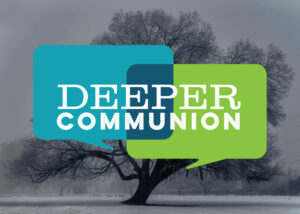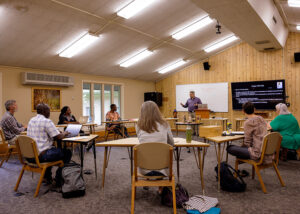Assembly 2016 was an excellent example of a very integral aspect of the life of our national church, our area churches and our congregations. The process of discernment was on display during the event. This is one of the gifts we have received which flows from our congregational discernment work to our work in peacemaking and mediation, and to Mennonite Central Committee and all its “children.”
We commit ourselves to reading the Bible together in community when we seek to follow Jesus in the Anabaptist tradition, according to Article 4 of the Confession of Faith in a Mennonite Perspective. This means that the leaders during the discernment process are most concerned to listen well. This also means that the delegates or church members—depending on the setting—seek to listen so that the discussion on the floor is connected with the main theme embodied in a resolution or proposal. The contributions at the microphone during Assembly 2016 were often moving and insightful, and were consistently polite. The goal we sought in Saskatoon was that the whole church was represented through the delegate system.
There is a story I grew up with that makes the above more clear: From 1910 to 1915—a century ago—12 paperback volumes of essays focussed on doctrine were published by Lyman Stewart, a California oil millionaire, with the assistance of his brother Milton. They called themselves “two Christian laymen.” They chose an editor and paid his salary, and the editor selected contributors of at least 100 essays. The two brothers paid for the publication and distribution costs of at least three million copies sent to every church pastor, seminary professor, Sunday school and missionary in the English-speaking world. Those 12 volumes were entitled “The Fundamentals,” and are the source of the term “fundamentalism.”
Most writers commenting on these books talked about the doctrines—many of them developed in the previous century. But I wish to note that it was a promoter/investor/layman or a “wallet” that was a principal factor in the introduction of a new set of doctrines. Preachers, evangelists and seminary professors were engaged to present the theories or doctrines in an academic style.
But there was no involvement of the people in congregations in the development of these doctrines. This was an elite group, and this model of “defending the true faith” remains with us today. It draws its inspiration from the American business environment of the late 19th century, and it remains the operational model for many evangelical church and para-church organizations.
We Mennonites, on the other hand, do church in a unique way. We need leaders of discernment processes. We certainly need individuals and congregations experienced in following the Spirit in this way. So let us “call out” those who should be trained to lead, and let us all learn to participate well in future discernment.
Dan Jack is the moderator of Mennonite Church Alberta.
More about the decisions at Assembly 2016:
Hope through lament and loss (overview)
Decision roundup: Assembly 2016
‘We are all responsible for what happens next’ (Future Directions)
Delegates vote to allow space for differences (Being a Faithful Church)
Delegates have spoken (a word from Willard Metzger)
Action seeks solution for Israelis and Palestinians






Leave a Reply
You must be logged in to post a comment.